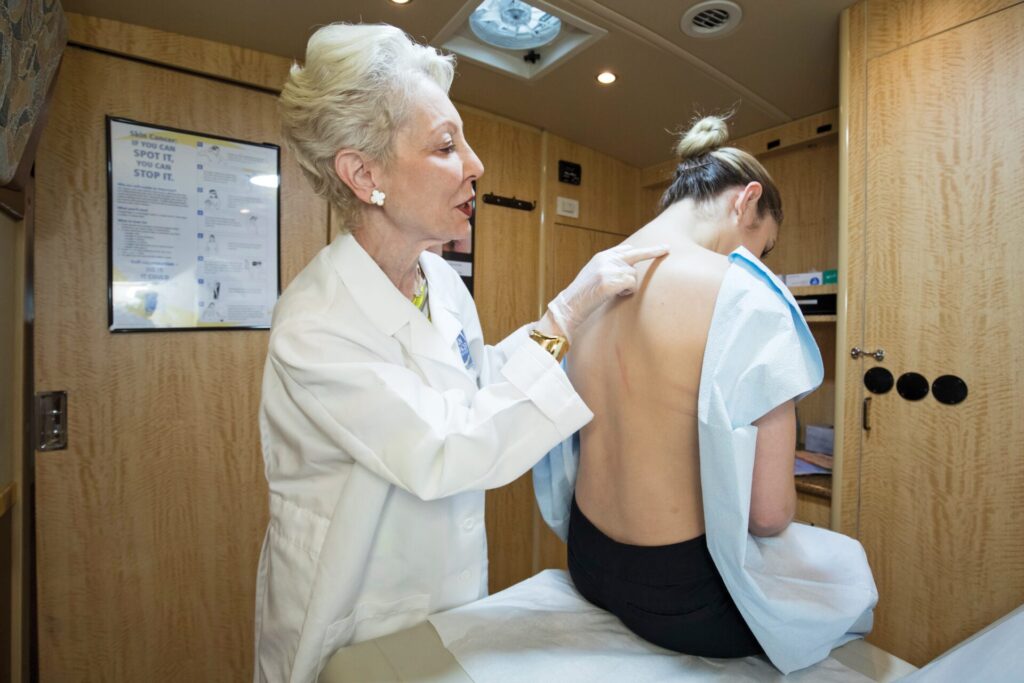As a Destination: Healthy Skin volunteer in 2019, Dr. Sarnoff, The Skin Cancer Foundation’s president, performed free skin exams in the Foundation’s RV. The program, postponed this summer because of the pandemic, will return in 2021.
By Deborah S. Sarnoff, MD
Early detection plus prompt treatment equals the best outcome in any skin cancer. Often, time is of the essence. So it is never a good idea to postpone a skin exam with your dermatologist, especially if you have noticed anything new, changing or unusual on your skin. And if your instinct tells you that it is not right, trust that feeling and make an appointment. Here are common excuses I’ve heard — and my response to them.
1. I’m scared to see a doctor while the coronavirus is still around.
OK, this has been a valid excuse for many people. The COVID-19 pandemic has turned our world upside down and continues to do so in many states. It has been very important to comply with social distancing, wearing a mask and staying home to help save lives. Some dermatologists temporarily closed their practices, and some have reopened for necessary treatments and surgeries. Others are practicing video visits, or telemedicine (also called teledermatology).
Many patients have postponed routine appointments like skin exams for months. However, some skin cancers can be life-threatening, and putting off seeing a dermatologist could put your life at risk.
If you have a lesion that concerns you, especially if it has gotten much larger or darker in a short time, call your dermatologist’s office and see what options are available. Telemedicine and photos may help determine what can wait a little longer — and what cannot. If you need a skin biopsy or a particular procedure that cannot wait, your doctor may be able to meet you at his or her office and render the care. If that is not possible, your doctor will help you find a provider in your area that is safely open for business.
Now, on to the more common, everyday excuses:
2. I don’t know what to expect.
It’s normal to be nervous about a medical examination that you’ve never experienced before. But skin exams are routine, quick, noninvasive — and every dermatologist is trained to do them. You may be lying down or sitting, and you’ll be mostly covered with a gown or drape, which the doctor will fold back briefly in each area being checked, then have you turn over. Yes, the doctor needs to look at every square inch of you, because skin cancer can develop even in areas not exposed to the sun. Your physician may also use a small handheld microscope called a dermatoscope to look more closely at a mole or lesion.
3. I’m not comfortable alone and naked in a room with a doctor I don’t know.
I understand this. If you’d prefer a same-sex doctor, request one. Most body checks have an assistant or chaperone in the room, and you can ask for one if not immediately provided.
4. I don’t have time.
Your health is paramount, and you can’t help others if you don’t make time for you. If you work, ask your employer what the policies are for doctors’ appointments. Some people take a personal day to schedule more than one wellness checkup all at once. I tell my patients, especially the ones who have trouble remembering to make appointments, to “examine your birthday suit on your birthday.” If you schedule your annual checkup this way, it’s harder to forget, you feel guilty if you miss it and you can plan it in advance since you know exactly when it needs to happen. It also means that all my patients don’t flood in at the same time because birthdays are spread throughout the year.
5. I can’t afford it.
If you have health insurance, look for a provider in your plan. That way you’ll only be responsible for the deductible, copay and/or coinsurance, and you should be able to figure out what you will owe before you walk into the office. If you don’t have insurance, don’t be afraid to speak up to your doctor and ask for a reduced rate. Free screenings and clinics may be available in your area. Early screenings can help you avoid more expensive treatments later.
6. I’d rather not know if something is wrong.
OK, you already know this is magical thinking. Medical problems do not appear only when you go to the doctor. Nor will it inevitably be an ordeal. It’s always better to catch something early, before it becomes a problem in your day-to-day life. The most important thing is to find a doctor you trust, who gets to know you and your skin and treats you like a member of the family. Once you build a relationship with your dermatologist, you’ll find that regular skin checks get easier and easier over time.
7. I might need a biopsy while I’m there, and I’m terrified of needles.
Tell your dermatologist. We’ve seen everything and have a lot of tricks up our sleeves to help you. We can do “talkasthesia” to help distract you. We can confuse your nerve cells with a little vibration tool. We can use numbing cream or spray so you don’t feel the injection. If you think you might faint, we keep smelling salts in the cabinet, orange juice in the refrigerator and lollipops on the shelf. We know how to put people in the Trendelenburg position so more blood goes to your head should you pass out. Read more about what to expect during a biopsy here.
8. I don’t want a scar.
A superficial shave biopsy is usually not the reason you have a scar. And if you’re worried that removing a lesion is going to leave a scar, the lesion is probably more prominent and distracting than a little scar will be. Treatments these days are quite advanced and may leave no scar at all. Plus, if something needs to be removed, removing it early decreases your chance of ending up with a large scar. So don’t delay.
9. I have more serious health issues to deal with.
The skin is the largest organ in your body, and you need to take care of it no matter what. Even if you have bigger fish to fry, please go get your skin check anyway. Let’s say you’re on chemo, or on a blood thinner and are worried about needing to get a biopsy. If it’s not an emergency, not something like a melanoma, chances are you can delay the biopsy, or your dermatologist can adjust treatments accordingly. Tell your dermatologist if you’re on a blood thinner because we have several ways to stop any bleeding. Definitely talk to your physician about what else is going on, but go get the opinion and then we’ll talk about options to defer treatments if necessary.
10. C’mon, doctors always find something to remove.
That’s not true, and it would be unethical. We may err on the side of caution to find out what we really need to know. Lesions don’t always read the textbook, and while our experience goes a long way, a lab test may be needed. You should take an active role, too. Get to know your skin, and do monthly self-exams at home. Look for anything new, changing or unusual, and write down when it first appeared. Take a photo of it, too, and watch it. If anything doesn’t seem right, call and speak up. Your trusted dermatologist will listen to you.
Deborah S. Sarnoff, MD, is a clinical professor of dermatology in the Ronald O. Perelman Department of Dermatology at NYU School of Medicine. Cofounder and codirector of Cosmetique Dermatology, Laser & Plastic Surgery LLP in Manhattan and Long Island, Dr. Sarnoff is also president of The Skin Cancer Foundation.






